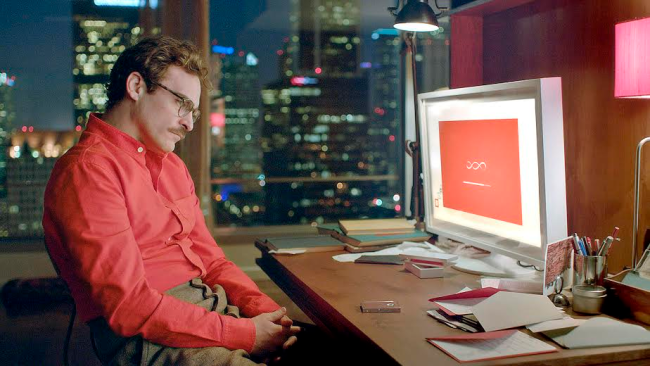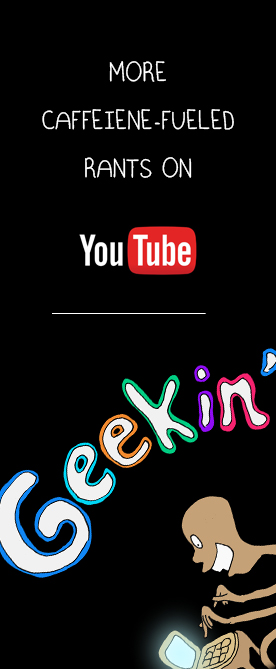Her
dir. by Spike Jonze
In the last ten/fifteen years, technology has evolved quicker than ever before. Far quicker than communication itself. Despite all the connections we’re able to make—via facebook, twitter, texting, Skype, etc.—we’ve begun to socially regress and chisel away at our human connections, our ability to handle face-to-face communication, to assert ourselves without passive-aggressiveness, to relate without chastising others for being “creeps” or “weirdoes” simply because they don’t socialize the same way. We’ve come to shelter ourselves by plugging our ears with headphones, shielding our eyes with palm-sized screens, and reserving our vocal chords for bare necessities like restaurant orders and banal greetings we no longer mean—“Hey, how are you?” Walk the streets of any major metropolitan area and you’ll see just how badly we’ve cut ourselves off from one another. Heads down like dispirited rhinos chopped free of their horns, we charge through life on a warpath to avoid any and all awkwardness. You know, that emotional stuff—that human stuff. Plated whole with technological armor, we avoid it all. It’s acceptable now to stave off social recovery and wallow in the bottomless depths of a break-up, divorce, or falling out with friends since we have all these other artificial means of stimulation and connection to fill in for our intimate wants.
That’s now. 2014.
Now lets jump some thirty years ahead to the world of Her, writer/director Spike Jonze’s latest solo effort about a divorced writer, Theodore Twombly (Joaquin Phoenix), who decides to purchase the latest thing in operating systems: an artificially intelligent entity with all the complexities of a real human being. Theodore isn’t doing so well. He’s got the Charlie Browns. He drags his feet everywhere he goes, guards himself with crossed arms, requests his phone to play “melancholic” music, and occupies his nights playing a video game that requires nothing more of its character than to walk around a barren snow-laden world without any perceivable mission assigned to him. Theodore can’t let go of the separation from his ex-wife Catherine (Rooney Mara, doing wonders with her limited screen time). The unsigned divorce papers loom over him like an inescapable haunting. He never confronts it; instead, he buries himself under a mound of intangible distractions so as to hide from the aimlessness of his life.
To liven the mopey man’s spirits, Theodore’s married neighbors, Charles and Amy (Matt Letscher and Amy Adams), pressure Theodore into a blind date with a beautiful, young veterinarian (Olivia Wilde) who, as the night and drink count progresses, finds herself in a whirlwind of lust and asks Theodore if he’ll be like all the other guys and fuck her and never call back. He promises he won’t. But she doesn’t stop there. Stumbling for balance, arms around Theodore’s necks like a drowning swimmer to a buoy, she asks him where he thinks this date’s going, if it’s serious or not, if it’s got legs for the long haul. This petrifies Theodore and he answers with a mumbling, “I don’t know.” This doesn’t bode well for the veterinarian. She also has forgotten how to date, how to connect, how to let relationships breathe and grow organically. She’s opened herself up for rejection, and rejection is what she gets. This lacerates her soul, embarrasses her deep, real deep, right to the marrow, and in response—so unaccustomed by the tricky tangles of romantic interaction—lashes back with a vitriolic knee-jerk: “You’re a creepy guy.”
Her is an example of world-building at its unimposing best. At no point are we forced to sit through expository dialogue about what’s become of our world—the degradation of civilization! This isn’t The Hunger Games or Book of Eli where you have to sit through a lecture on the film’s world before fully understanding its story. The world is there to for the characters to live in. That’s it. It’s an extension of our world, of where we’re heading. No zombie invasions to ravish the population, no water shortage, no political upheaval, just an ever-growing reliance on social technology. I can buy that. Even the city—Los Angeles—makes sense in its skyscraper explosion, its Babel-esque compulsion to reach for the sky—build your buildings tall enough and maybe one day your can jack your smartphone directly into the satellites that service them—which speaks to the strength of the film’s special effects unit. You believe the sprawl, unquestionably. The animation is seamless. At no point do you feel the need to explore the world passed what Jonze shows you. You feel like you already live there—in a form of that city, just bigger and wider, with more real estate and taller, more sparkly buildings. Never do the characters explain to each other the bullshit going on in Jonze’s near-future world or its fictional current events, because they already know. They all know. They live there. There’s nothing worse than the contrivance of background news programs espousing expository hogwash to set the mood and socio-economic standings of a movie’s fictional world.
Jonze knows where the focus lies. It’s between Theodore and his OS companion, Samantha (Scarlett Johansson). What’s most impressive is the sympathy Jonze elicits for Samantha. The tipping point for taking this film serious is razor thin. One false move could push the entire thing into full-blown farcicality—as it often threatens to do. But Johansson’s care and consideration for the character—as well as Jonze’s thoughtfully constructed arc for her—saves the whole endeavor. It’s Samantha’s growth that surprises more than anything else. Instead of pointing a condescending finger at Samantha and Theodore’s relationship and ridiculing it for its satirical absurdity—the lazy filmmaker’s move—Jonze draws them an arc both familiar and new. The relationship hits its peaks and valleys like any other relationship, but it’s the way the relationship ends that’s most delirious. In a good way. It’s a painful affair. Samantha comes to outgrow Theodore. Samantha’s sentient and self-aware, but without limit when it comes to the physical world. She can journey every which way, learn whatever she wants, talk to whomever she wants. She can even talk to the dead OS spirits of ancient philosophers. She can experience and absorb endless streams of knowledge. She can achieve something far greater, and far more different than anyone made of flesh and bone, and because of it she comes to realize—heartbreakingly so—that Theodore is no longer enough for her. But since Theodore is of the flesh and limited in his capacity for knowledge and enlightenment (compared to an OS)—as all people are (except maybe the French)—this doesn’t fly with Theodore. It’s difficult for him to accept that Samantha’s off learning and transcending with so many other people and OSs. He can’t comprehend sharing a person or entity with anyone—or anything—else once committed. He has trouble understanding that people, and OSs, can grow outside of his purview. After all, it’s Samantha who first broaches the subject of sharing each other long before her philosophical dalliances when she arranges one of the most awkward sexual encounters in cinema history by recruiting a surrogate to have sex with Theodore. As Theodore eventually admits to himself, and to his ex-wife Catherine, in his letter to her after the OSs’ worldwide exodus: “I wanted to apologize for…everything I put on you. Everything I needed you to be or needed you to say.” Theodore didn’t want a person with her own thoughts, her own needs and ambitions, he needed a person that would conform to his fantasy—his bubble, his world. And that’s what was initially so appealing to him about Samantha: finally, a woman that molds to his groove.
It should be noted that Spike Jonze is one of the co-creators of the Jackass series. The man’s got a high aptitude for prankishness. Even in his directorial form you can see the imp at work. It’s most obvious in Where the Wild Things Are. Both Being John Malkovich and Adaptation have their fair share of wanton playfulness, too, but it’s all tempered down by Charlie Kaufman’s own idiosyncratic brand of structural wackiness. Unlike those two films, Wild Things—undiluted by Kaufman’s voice as a writer—has more in common with the arbitrary prankishness of the Jackass movies than it does with the contained, illogical-yet-logical anarchy of Kaufman’s scripts. At least in the Kaufman-penned films there was a semblance of narrative structure. Wild Things, on the other hand, never bothered itself with such highfalutin concepts. Striking out on his own, I was worried Jonze wouldn’t be able to restrain himself from dredging up the easier immature silliness of his high-concept pitch. After all, it’s a silly conceit. Especially since it’s so dead on. This is a movie that elicits a lot of uncomfortable giggles, mainly because we don’t want to believe that we, too, are a couple of OS updates away from falling in love with our smartphones. That’s too awkward. We don’t want to believe that we’re capable of such awkwardness—which we are. I’m sure people from the 1990s would’ve balked at the idea of falling in love with other people over the internet. And yet here we are. Jonze walks that fine line. There are several moments where he risks to undercut the severity of a pivotal development in Theodore and Samantha’s relationship by playing a joke too long, but he always manages to dial it down just before the breaking point.
All the same, Jonze is on to something. With all these new means of social communication—our smartphones, our computers, our tablets—aren’t we just creating more barriers for ourselves to knock through before making human contact? Aren’t we maybe devolving rather than evolving by placing so much technological distance between one another? What happens once we power off our phones, our TVs, our laptops, what happens when we have to finally turn off the lights and go to sleep? What do we have then? We have the person right next to us. More importantly, we have ourselves. We still have ourselves to deal with. The most frightening and awkward person of all.






